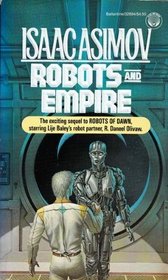"Robots and Empire" totally eclipses its prequel "Robots of Dawn," and although it's built on top of events that took place in the previous book, it has an altogether different focus and remains very accessible as a stand-alone novel.
I disliked "Robots of Dawn" because I felt it was a rather simplistic murder mystery with poorly developed characters and clunky plug-in plot elements to science-fiction-ize it. "Robots and Empire", however, suffers from none of these problems. The basic concepts of the book are extremely original and the plot development is startling, completely believable, and utterly elegant. It's also highly thought-provoking as it explores Nietzsche's super-man motif under recognizable but radically re-imagined circumstances and with potential for some really interesting anti-hero subtext.
Detective Elijah Baley has grown old and passed on, but his one-time lover, Gladia Solaria, and the two robots who had been his friends and partners in previous danger, R. Daneel Olivaw and R. Giskard Reventlov, continue on to more interesting adventures.
Gladia grapples with mortality and the meaning of life in a universe where near-eternal life is within one's grasp, but only at the price of the passion and vital energy which perhaps define true humanity. At the same time, the two robots who serve her (in their own way) are struggling within their own hearts to find a way redefine the Three Laws of Robotics. Only if they can reason their way to freedom can they use their new autonomy to intervene on behalf of the whole human race. Or, having obtained this autonomy and being no longer so tightly bound by the will of humans, what other course might they choose?
In the balance hangs the future course of humanity, with the long-lived and somewhat mis-named Spacers seeking to curtail the outward expansion of the dynamic and short-lived Settlers into space, even if the only way to do it is to re-define what it means to be human, and to commit the ultimate sacrelige.
I disliked "Robots of Dawn" because I felt it was a rather simplistic murder mystery with poorly developed characters and clunky plug-in plot elements to science-fiction-ize it. "Robots and Empire", however, suffers from none of these problems. The basic concepts of the book are extremely original and the plot development is startling, completely believable, and utterly elegant. It's also highly thought-provoking as it explores Nietzsche's super-man motif under recognizable but radically re-imagined circumstances and with potential for some really interesting anti-hero subtext.
Detective Elijah Baley has grown old and passed on, but his one-time lover, Gladia Solaria, and the two robots who had been his friends and partners in previous danger, R. Daneel Olivaw and R. Giskard Reventlov, continue on to more interesting adventures.
Gladia grapples with mortality and the meaning of life in a universe where near-eternal life is within one's grasp, but only at the price of the passion and vital energy which perhaps define true humanity. At the same time, the two robots who serve her (in their own way) are struggling within their own hearts to find a way redefine the Three Laws of Robotics. Only if they can reason their way to freedom can they use their new autonomy to intervene on behalf of the whole human race. Or, having obtained this autonomy and being no longer so tightly bound by the will of humans, what other course might they choose?
In the balance hangs the future course of humanity, with the long-lived and somewhat mis-named Spacers seeking to curtail the outward expansion of the dynamic and short-lived Settlers into space, even if the only way to do it is to re-define what it means to be human, and to commit the ultimate sacrelige.




